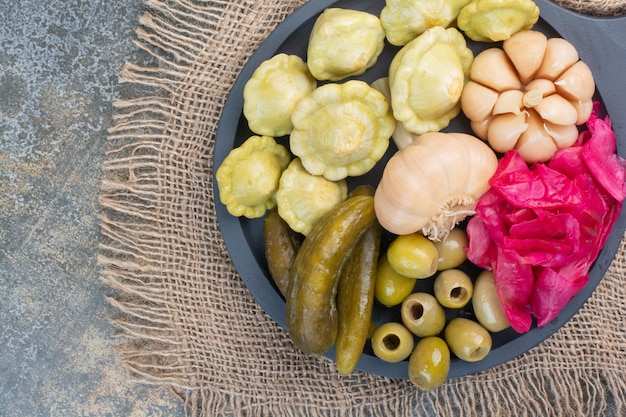
Fermented foods, like sauerkraut, kimchi, and kefir, are really popular these days, but do they actually offer health benefits? Let’s dive into one woman’s experience and what experts are saying about these foods.
Thirteen years ago, Donna Schwenk was 41 and pregnant with her third child. She developed a condition called preeclampsia, which caused her liver to start failing. Her baby, Holli, had to be delivered prematurely, weighing just four pounds. Donna herself developed diabetes, high blood pressure, and extreme fatigue. Unable to care for her newborn properly, she started searching for answers.
One day, Donna found a book called “The Body Ecology Diet” by Donna Gates in a health food store. It talked about kefir, a fermented milk drink rich in beneficial bacteria. Encouraged by a store assistant, Donna began adding kefir to Holli’s bottles, and within a month, Holli had gained four pounds.
Donna began drinking kefir herself, and within 12 weeks, her blood sugar and blood pressure were back to normal. She felt joy and wellness for the first time in years. Inspired by her recovery, Donna wrote “Cultured Food for Life,” advocating for the health benefits of fermented foods.
Emerging research supports the idea that fermented foods can improve digestion, immunity, weight metabolism, and even mood. Donna appeared in a PBS special about the health benefits of fermented foods, highlighting how foods like kefir, yogurt, and sauerkraut can boost our health.
Fermented foods have become quite trendy. For instance, Michael Pollan, a healthy eating advocate, has explored DIY food fermentation and praises it for its health benefits.
Kimberly Snyder, an LA nutritionist, also recommends eating fermented vegetables daily. She believes that restoring the balance of good bacteria in our bodies can help with weight loss, skin improvement, and increased energy.
Recent studies emphasize the importance of gut health. Kathie Swift, a clinical nutritionist, states that the gut is crucial for overall health. Imbalances in gut bacteria can lead to various health issues, including food intolerances, chronic fatigue, autoimmune diseases, and skin disorders. Swift starts with gut health in her treatments, as it affects digestion and the absorption of vitamins.
Scientists have even found that altering gut bacteria can influence weight and mood. For example, replacing the gut bacteria of obese mice with that of lean mice led to weight loss. Another study showed that anxious mice became calmer after receiving gut bacteria from more fearless mice.
It’s essential to maintain a healthy balance of gut bacteria. Diets high in sugar and caffeine, stress, and certain medications can disrupt this balance. To restore good bacteria, experts recommend consuming a variety of fermented foods. These foods offer different strains of beneficial bacteria, which are crucial for gut health.
For example, kefir contains different bacteria than sauerkraut, and kombucha contains yet another type. Eating a mix of these foods can help ensure a diverse range of good bacteria in your gut.
While probiotic pills are an option, they may not be as effective as fermented foods. Some pills contain “bad” bacteria, and they may be derived from human waste. Fermentation, on the other hand, has been a part of traditional diets worldwide for centuries.
Fermented foods, like Korea’s kimchi and Germany’s sauerkraut, have long been valued for their health benefits. In Japan, fermented foods like miso soup and natto contribute to one of the highest life expectancies in the world.
However, it’s important to consume fermented foods in moderation. Overeating them can lead to an upset stomach. Start with small amounts and gradually increase your intake.
When buying fermented foods, look for labels with raw, live cultures. Avoid products that have been pasteurized or heat-treated, as they won’t contain live cultures.
You can also make your own fermented vegetables using a jar and some salt. Fermenting fruits like lemons and limes can be delicious as well. Including a variety of fermented foods in your diet will help maintain a healthy gut flora.
In addition to fermented foods, incorporating prebiotic foods like onions, garlic, and bananas can support the growth of good bacteria. Avoiding excessive sugar is also crucial, as it feeds bad bacteria.
Popular fermented foods include:
– Kefir: A fermented milk drink that can be made with dairy, coconut, or soy milk. It’s rich in beneficial bacteria.
– Miso: A soybean paste that can be used in soups and broths. It comes in various flavors, like sweet white miso.
– Sauerkraut: Fermented cabbage that can be made at home or bought from stores. It’s packed with probiotics.
– Coconut Yogurt: A dairy-free yogurt alternative made from coconut milk. It’s easy to make at home or can be purchased.
– Kombucha Tea: A fermented tea available as a sparkling drink. It’s known for its unique taste and health benefits.
Including these fermented foods in your diet can have significant health benefits. Start small, choose a variety of foods, and enjoy the positive effects on your gut and overall well-being.




